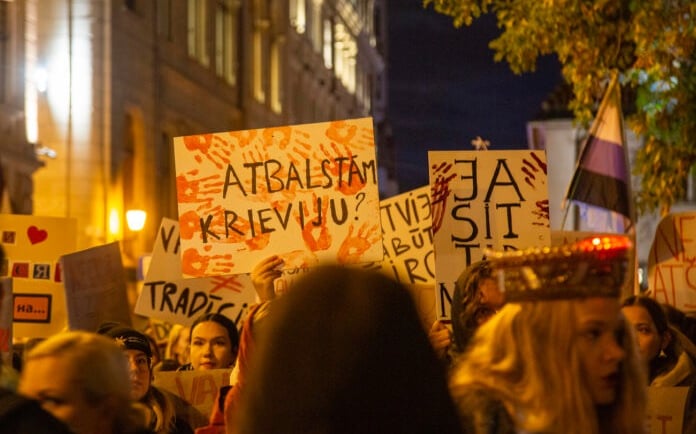Youth Protests Shake Latvia: Saeima’s Bid to Withdraw from the Istanbul Convention sparks outrage
Latvia is facing intense public and political turmoil after the Saeima fast-tracked a proposal to withdraw from the Istanbul Convention, the Council of Europe’s treaty on preventing violence against women. Although Latvia only ratified the convention in 2024, conservative lawmakers now claim it promotes “gender ideology,” a view strongly rejected by human-rights groups, scholars, and feminist organizations who stress that the treaty focuses solely on protecting victims of violence. The move has sparked widespread resistance: more than 20,000 people protested in Riga, student unions issued a joint condemnation, and public opinion polls show most Latvians oppose withdrawal. International bodies, including the OSCE, Amnesty International, and the WAVE Network, warn that Latvia could become the first EU member to exit the convention, damaging its human-rights credibility. A final parliamentary vote is expected in early November, after which President Edgars Rinkēvičs will review the bill’s constitutional compliance.
Saara Sharma
11/21/20252 min read


The Istanbul Convention was signed by Latvia in 2016, and came into effect on May 1, 2024. It is the first international binding instrument that clearly and exhaustively addresses the issue of violence against women. Latvia's ratification of the treaty was a turning point in the country's human rights commitments within the EU and the Council of Europe.
However, on October 23, the Saeima decided to examine a withdrawal draft without following the normal parliamentary procedure. A day earlier, the Latvian Parliament had voted for an alternative declaration to the convention with 56 in favour of it. The basis of this withdrawal was that the agreement led to the so-called “gender ideology,” which was “incompatible” with the cultural values of Latvia.
Civil Resistance and International Condemnation
The incidence of planned withdrawal ignited a loud public denunciation. On 29 October 2025, more than 20,000 people took to the streets of Riga as part of an anti-withdrawal protest. Public opinion polls reveal that just about 31 per cent of citizens were in favor of withdrawal, while 49-54 per cent were against it, with opposition being strongest among women and the younger generation.
The students’ communities have voiced their opinion clearly. The European Students’ Union (ESU) and Latvian Students’ Association (LSA), have jointly issued a statement opposing the government's intention. “We cannot debate human rights,” said the statement, pointing out that Latvia’s exit from the convention “endangers the protection of women and victims of violence, which has made significant progress over the years.”
The topic has unmasked the ideological fault lines within Latvia. The conservatives and nationalists evoke the convention as a vehicle to “impose foreign gender concepts” on the locals; on the other hand, the pro-European and progressive parties opine that the treaty “provides Latvia with more legal and institutional tools to fight against domestic violence, a chronic issue in society”.
Political Polarisation and Legal Implications
The OSCE's Special Representative on Gender Issues appealed to Latvia to fulfil its obligations, while the WAVE Network and Amnesty International warned that if it happens, Latvia would become the first member state of the EU to depart the convention, causing a breach of trust.
Despite the backlash, the Foreign Affairs Committee of Saeima has been very clear and confident in its decision to reject the submissions of pro-Convention deputies at the stage of the bill’s second reading. The deputies have decided to postpone the final voting to November 2026, followed by the sending of the bill to President Edgars Rinkēvičs. The latter, however, has indicated that he would consider the bill’s compliance with the Constitution before affixing his signature.
For the time being, protests are taking place on a regular basis. According to ESU and LSA, “Human rights are non-negotiable, and no democratic government ought to treat them as such.” What will happen next month will be a measuring stick for whether Latvia is going to adhere to the rules it had ratified barely a year ago, or it will be counted among those nations that are backing down from the international hard-won standards on women’s rights and equality.
Revolutionising Youth Media


